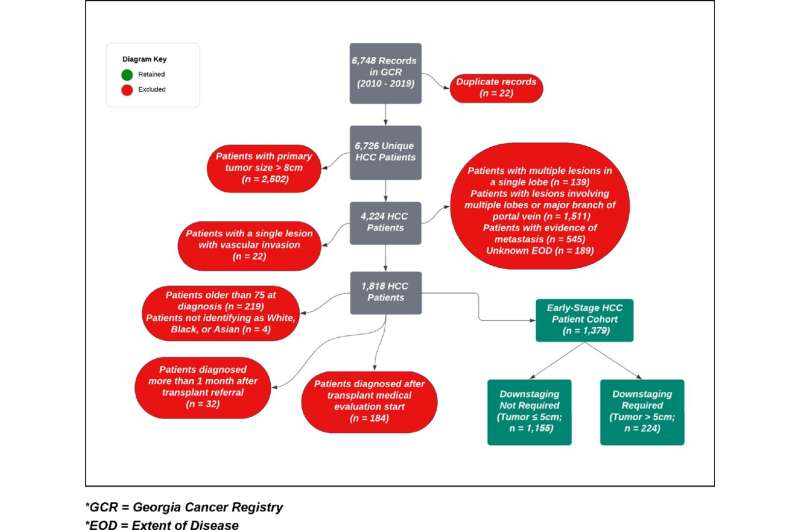This article has been reviewed according to Science X's editorial process and policies. Editors have highlighted the following attributes while ensuring the content's credibility:
fact-checked
trusted source
proofread
Older, poorer, Black, Medicaid beneficiaries less likely to be placed on liver transplant lists: Study

A new, healthy liver offers the best survival for patients with early-stage liver cancer. But a new study, led by Katie Ross-Driscoll, Ph.D., MPH, of Regenstrief Institute and Indiana University School of Medicine Department of Surgery, has identified disparities in liver transplant referral and evaluation, which must precede waitlisting, for these potentially lifesaving procedures.
While other studies have demonstrated disparities in placement on organ waitlists, the new study is one of the first to examine the transplant process prior to liver transplant waitlisting—following patient progress along the continuum immediately after liver cancer diagnosis.
"Undergoing a transplant, which is the only cure for liver cancer, requires patients to navigate a very complex process after diagnosis," said Dr. Ross-Driscoll. "If referred to a transplant center, the patient needs to follow up on the referral and then complete a comprehensive medical and psychosocial evaluation.
"After this evaluation, transplant centers will decide whether or not to place patients on the deceased donor waiting list. We examined progress through the steps prior to placement on the waiting list and found that different factors predicted whether these pre-transplant steps are completed."
Factors associated with whether or not a patient received a referral from their physician to a transplant center after diagnosis of liver cancer:
- Age: the older the patient (up to age 70, the cutoff age for transplant eligibility) the less likely they were to receive a referral.
- Insurance type: Patients who had Medicare, Medicaid or other non-private insurance types were less likely to receive a referral than patients with private insurance.
Of those patients who were referred to a transplant center:
- Black patients were less likely than White patients to initiate a transplant evaluation.
- Patients who lived in higher poverty neighborhoods were less likely to initiate the evaluation than patients who lived in lower poverty neighborhoods.
- Of those patients who initiated the medical and psychosocial evaluation, those who had Medicaid insurance were about half as likely to complete all necessary steps of the evaluation process as patients with private insurance.
"These findings indicate patients with liver cancer who are older (but under the cutoff age for eligibility), poorer, Black or Medicaid beneficiaries are less likely than others to make it through the early steps of the transplant process," said Dr. Ross-Driscoll.
"While our results are based on cancer registry data from patients referred to Georgia's two transplant centers, we believe that our findings are potentially relevant across the United States. Future studies are needed to understand how barriers might vary across transplant centers."
"There are very few studies documenting the steps prior to liver transplant waitlisting, and these results suggest the need to collect pre-waitlisting data nationally to inform where interventions should be targeted to improve equity in access to liver transplantation, said co-author Rachel Patzer, Ph.D., MPH., Regenstrief Institute president and CEO.
Liver cancer is one of the fastest growing cancers in the United States and shows no indication of slowing down. As liver cancer becomes more prevalent, understanding pathways to care for these patients becomes more important.
"Disparities in Access to Liver Transplant Referral and Evaluation among Patients with Hepatocellular Carcinoma in Georgia" is published in the journal Cancer Research Communications.
More information: Katherine Ross-Driscoll et al, Disparities in Access to Liver Transplant Referral and Evaluation among Patients with Hepatocellular Carcinoma in Georgia, Cancer Research Communications (2024). DOI: 10.1158/2767-9764.CRC-23-0541




















